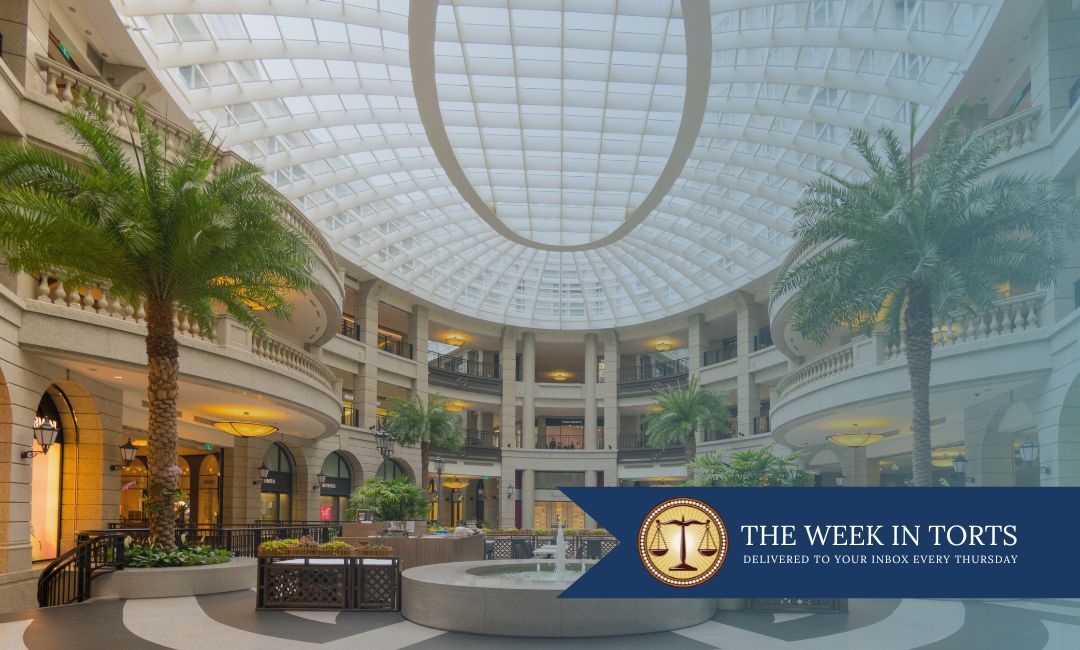The Week In Torts – Cases from July 14, 2023

Stop walking through the grass!
FLORIDA LAW WEEKLY
VOLUME 48, NUMBER 28
CASES FROM THE WEEK OF JULY 14, 2023
UNLESS AN LANDOWNER ALLOWS A CONDITION TO EXIST FOR ENOUGH TIME TO PLACE A LANDOWNER ON CONSTRUCTIVE NOTICE THAT PEOPLE ARE WALKING THROUGH LANDSCAPE AREAS, GENERALLY THEY ARE NOT DANGEROUS CONDITIONS AND LANDOWNERS DO NOT OWE A DUTY TO WARN.
Pio v. Simon Capital GP, 48 Fla. L. Weekly D1351 (Fla. 2nd DCA Jul. 7, 2023):
The plaintiff sued the store, the mall operator and the landscape company after getting injured when walking through a landscape area in the parking lot, where a tree had been removed, leaving a concealed depression in the grass.
The landscape area ran along a sidewalk that led from the mall’s grand entrance down to the public sidewalk, separating the parking spaces from the sidewalk. The plaintiff had parked perpendicular to the landscape area and stepped over the curb onto it walking through the grass to reach the sidewalk.
Plaintiff asserted that the defendants failed to maintain the premises in a reasonably safe condition, and failed to warn of the dangerous conditions that they knew or should have known about.
The court began by noting that as a matter of law, landscape features are generally not dangerous conditions. The record contained no evidence of a continuous and obvious use of the landscape area as a pedestrian shortcut. The court noted that there was no need for a shortcut path because the landscape area was surrounded by a parking lot and a sidewalk on all sides.
The court did state that trial judges must be “particularly restrained in granting summary judgment in negligence cases,” noting that summary judgment should not be granted unless the facts are so crystalized that nothing remains but questions of law.
On appeal, the plaintiff argued that the court should reverse the summary judgment because the defense failed to establish the lack of any dispute about that the area was not designed for walking.
There was also not enough evidence that this landscape area was routinely used as a pedestrian path, making it foreseeable to the landowner defendant. A security guard testified that people on occasion had stepped through the grass to reach the sidewalk, but that did not rise to the level of showing that the condition existed for enough time to place the landowner on constructive notice of its existence to preclude summary judgment.
Here there was no evidence that the grass bed had become a well-traveled foot path or that the grass bed had been a continuous and obvious use of a pedestrian shortcut, such that the mall was put on constructive notice of the condition. Thus, no duty was created.
The plaintiff finally argued that the trial court erred in granting summary judgment because the mall was vicariously liable for the condition that the landscape company created. However, because the plaintiff failed to show a separate entitlement to relief on that issue, (the landscaper was not liable as a matter of law), then the mall could not be vicariously liable either.
TRIAL COURT DEPARTED FROM THE ESSENTIAL REQUIREMENTS OF LAW IN STAYING LITIGATION BECAUSE PLAINTIFF HAD NOT PAID COSTS AWARDED IN A PREVIOUS VOLUNTARILY DISMISSED ACTION, BECAUSE THE CAUSES OF ACTION WERE NOT THE SAME.
Baute v. Crenshaw, 48 Fla. L. Weekly D1343 (Fla. 6th DCA Jul. 7, 2023):
The plaintiff had previously filed a lawsuit against the defendant in the defendant’s capacity as a trustee of a trust. In the prior lawsuit, the plaintiff asserted claims against the defendant, but the plaintiff ultimately filed a notice of voluntary dismissal of the prior lawsuit.
After the notice of voluntary dismissal, the defendant filed a motion to tax costs in the prior lawsuit. The trial court entered an order granting the motion as to entitlement, but never determined amount.
The day before dismissing the prior lawsuit, plaintiff filed a new lawsuit against the defendant in the defendant’s individual capacity. The defendant moved to stay the litigation pursuant to Rule 1.420(d) which the trial court granted. The plaintiff properly filed a petition for writ of certiorari (the proper mechanism to challenge a trial court’s order granting a motion to stay). Not every stay though causes a party irreparable harm.
Here, the court found the plaintiff would suffer irreparable harm. The trial court had unreasonably and indefinitely conditioned the plaintiff’s ability to pursue her lawsuit upon performance of a condition that did not pertain to the lawsuit.
The costs plaintiff was ordered to pay were from a different proceeding, and at the time the trial court ordered the plaintiff to pay the cost judgment, it was impossible to do so because the trial court had not determined the amount and not entered the final judgment.
Under the facts of this case, the trial court erred in staying the lawsuit when there was no order compelling payment of costs in the prior lawsuit, and the prior lawsuit was not involving all the same claims as the current lawsuit.


